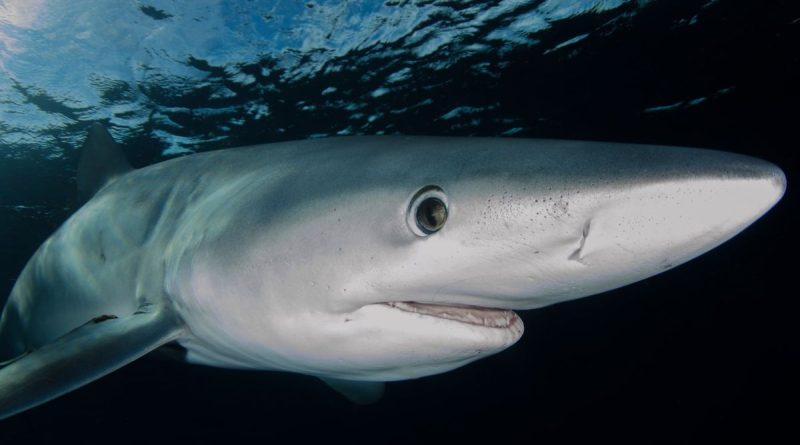Peter Benchley: the guilt that made the author of "Jaws" dedicate the rest of his life to protecting these animals | The State
Peter benchley may have had a tragic and ironic ending on a sunny day in Australia in 1974.
After the extraordinary success of his novel “Jaws”, Published that same year, the American writer was participating in a TV documentary about sharks.
During a diving sequence inside a protective cage, a great white shark nearly killed Benchley – by accident.
“Peter was inside the cage and the ship’s crew had thrown horse meat into the water to attract the sharks,” Benchely’s widow Wendy told the BBC.
“A beautiful white shark got to eat a bite, but it did not find the meat but it bit the rope that held the cage and it got stuck in its mouth.”
“As the filming continued, the cage was flipped up and down, back and forth. I grabbed the rope and pulled it free from the shark’s teeth. “
“I think I saved Peter’s life that day,” he adds with a laugh.

Wendy, who is an ocean conservationist and environmental activist, says the shark spent the next half hour selflessly swimming around.
Cultural phenomenon
Benchley’s novel sold approximately 20 million copies worldwide, but the film of the same name, released internationally in 1975, was the first production to reach $ 100 million at the box office.
Directed by then-young Steve Spielberg, with a libretto co-authored by Benchley, “Jaws” remains one of the highest grossing movies of all time.
But that success left Benchley with pangs of conscience until his death in 2006.
“Knowing what I now know, I could never write that book today,” stated the author in an interview promoting a commemorative edition of “Jaws” in 2005.
His account of a killer great white shark terrorizing the fictional coastal town of Amity Island in the US had a profound effect on the animal’s reputation – and serious consequences.
We may see them as dangerous predators, but it is actually sharks that have much more to fear from human activity. A combination of intense commercial fishing, trophy hunting and climate change threatens their populations around the world.
Shark survival is becoming increasingly precarious.

The International Union for Conservation of Nature (IUCN), an NGO, indicates that some 80 of 480 shark species are currently classified as “Threatened”, including the great white, so vilified in the movie “Jaws.”
In July this year, a network of marine biologists from around the world published the results of a five-year study that showed sharks were “functionally extinct” in 20% of the world’s coral reefs, which are crucial marine ecosystems. .
Sharks play a important role in marine life as predators by keeping the lower species within the food chain, something the Benchleys knew well.
“Peter and I learned a lot about sharks and we also had the opportunity throughout all these years to talk about their importance to the ocean,” says Wendy Benchley.
Hunted and threatened
Her late husband’s remorse began only a few months after the film’s 1975 release. The success of the film sparked a furious shark hunt in the US.
“Thousands of fishermen went out to hunt sharks for trophies after seeing ‘Jaws,’” wrote George Burgess, a renowned American shark expert in 2015.
To add insult to injury, commercial fishing to big scale it became the scourge of shark populations starting in the 1980s.

In 2013, a study published in the specialized journal Marine Policy estimated that the average number of sharks hunted each year worldwide is about 100 million.
Sharks are particularly prized for their fins, which are used in soups in several countries, but they are also collateral victims of large-scale fishing.
In addition, contrary to how they are represented in “Jaws”, these animals they are rarely a threat to humans.
The International Shark Attack File, a database managed by the University of Florida, reported just five deaths of people in 64 unprovoked shark attacks worldwide in 2019.
Wendy Benchley says her husband felt especially guilty about portraying sharks as creatures that bear a grudge against humans.
“It was the 70’s and people really didn’t know much about sharks. In the western world, people thought that a good shark was a dead shark, ”he explains.
“Peter put the knowledge he had in his book and naturally he made it as exciting as he could.”
“But then Spielberg took things to another level by making a great action movie.”
Benchley Reserves

According to his widow, Benchley liked the film adaptation of his book, but would later publicly express reservations about changes that were made to the original story.
“There were elements in the movie that Peter wished had been played down.”
“The most important aspect was feeling that Steven [Spielberg] he endowed the shark with too much revenge and some intelligence ”.
Wendy Benchley claims that, above all, the couple was “horrified” by some of the public reactions to “Jaws.”
“A lot of the reactions to the book and the movie were to say that sharks are monsters.”
Motivated by the negative responses, the Benchleys embarked on a campaign to defend sharks for the next several decades.
They linked up with a number of environmental organizations, cooperated in the production of wildlife documentaries, and toured the world giving talks.

The pair were also part of a campaign in China in the early 2000s that highlighted the impact of hunting sharks for their fins. Wendy Benchley says that helped reduce shark fin soup consumption in that country.
A forgotten legacy
But the environmentalist also thinks the book and film had a positive effect on increasing public interest in sharks and the ocean environment in general.
“Peter received thousands of letters from people saying that without ‘Jaws’ they would not have known how exciting the ocean is.”
“In the end it felt good,” he says.
The Benchelys never lost their fascination with the alpha predators of the ocean and continued to seek to interact with them.
Peter and Wendy came to celebrate their 40th wedding anniversary in 2005 by swimming with white sharks off the island of Guadalupe in Mexico, just a year before Peter died of lung disease.
“Some got so close that we could touch them,” recalls Wendy Benchley.
“It has always been an incredible experience to see these beautiful creatures.”

To promote ocean conservation, Peter Benchley also published a nonfiction book on sharks, but other of his works have come under fire.
After “Jaws,” he wrote other novels about nautical threats, notably one about a giant squid that threatens the Caribbean island of Bermuda (“Beast,” 1991) and the story of a shark-human hybrid genetically engineered by the Nazis, who is accidentally released into the Atlantic (“White Shark”, 1994).
Both books were adapted respectively for TV and cinema, but neither managed to scratch the success of “Jaws.”
Sharks and confinements
Wendy Benchley defends the legacy of “Jaws” (the book) as a story of the way humans behave in the face of the challenges of nature.
“The book is much more about how the public reacts to a threat they don’t know about and don’t know how to defend against,” he says.

She believes her late husband would have been flattered by the mention of his most famous book in newspaper articles in the US and Europe during the covid-19 pandemic. The columns drew parallels between how authorities in fictional settings and the real world deal with major crises.
Specifically, Wendy Benchley mentions the plot in which Larry Vaughn, the fictional mayor of Amity Island, insists on keeping the beaches open despite incidents with sharks. He does not want to scare away tourists during the summer holidays as it would damage the local economy.
“(Covid-19) is an invisible threat that you cannot control and is found all over the world,” he says.
And how do people behave? In my country, some – like the current president – decide to ignore it ”.
“They are going to keep businesses open and let people die, just like the mayor of Amity did,” he concludes.
Now you can receive notifications from BBC Mundo. Download the new version of our app and activate them so you don’t miss our best content.
.



